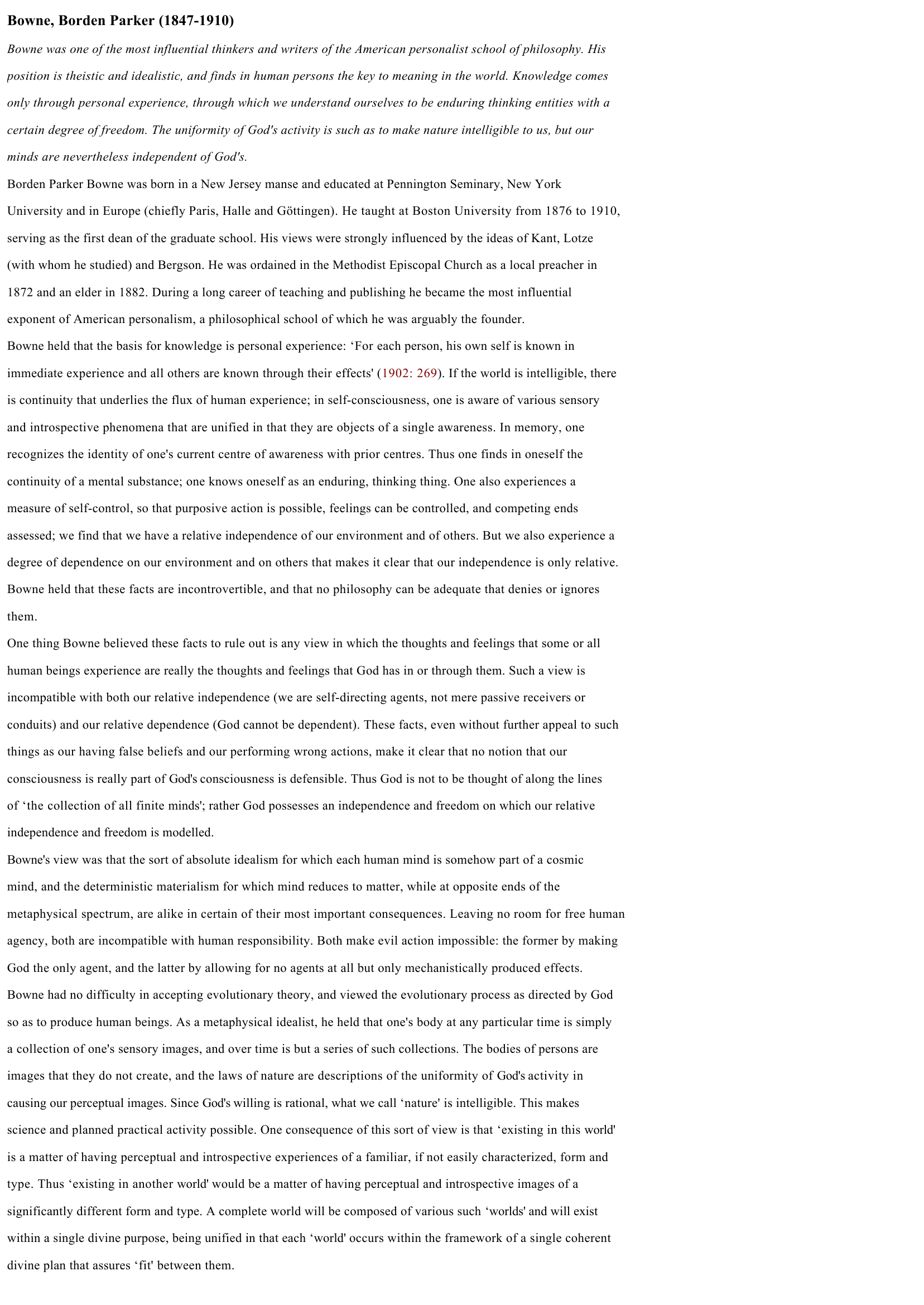Bowne, Borden Parker
Extrait du document
«
Bowne, Borden Parker (1847-1910)
Bowne was one of the most influential thinkers and writers of the American personalist school of philosophy.
His
position is theistic and idealistic, and finds in human persons the key to meaning in the world.
Knowledge comes
only through personal experience, through which we understand ourselves to be enduring thinking entities with a
certain degree of freedom.
The uniformity of God's activity is such as to make nature intelligible to us, but our
minds are nevertheless independent of God's.
Borden Parker Bowne was born in a New Jersey manse and educated at Pennington Seminary, New York
University and in Europe (chiefly Paris, Halle and Göttingen).
He taught at Boston University from 1876 to 1910,
serving as the first dean of the graduate school.
His views were strongly influenced by the ideas of Kant, Lotze
(with whom he studied) and Bergson.
He was ordained in the Methodist Episcopal Church as a local preacher in
1872 and an elder in 1882.
During a long career of teaching and publishing he became the most influential
exponent of American personalism, a philosophical school of which he was arguably the founder.
Bowne held that the basis for knowledge is personal experience: ‘For each person, his own self is known in
immediate experience and all others are known through their effects' (1902: 269).
If the world is intelligible, there
is continuity that underlies the flux of human experience; in self-consciousness, one is aware of various sensory
and introspective phenomena that are unified in that they are objects of a single awareness.
In memory, one
recognizes the identity of one's current centre of awareness with prior centres.
Thus one finds in oneself the
continuity of a mental substance; one knows oneself as an enduring, thinking thing.
One also experiences a
measure of self-control, so that purposive action is possible, feelings can be controlled, and competing ends
assessed; we find that we have a relative independence of our environment and of others.
But we also experience a
degree of dependence on our environment and on others that makes it clear that our independence is only relative.
Bowne held that these facts are incontrovertible, and that no philosophy can be adequate that denies or ignores
them.
One thing Bowne believed these facts to rule out is any view in which the thoughts and feelings that some or all
human beings experience are really the thoughts and feelings that God has in or through them.
Such a view is
incompatible with both our relative independence (we are self-directing agents, not mere passive receivers or
conduits) and our relative dependence (God cannot be dependent).
These facts, even without further appeal to such
things as our having false beliefs and our performing wrong actions, make it clear that no notion that our
consciousness is really part of God's consciousness is defensible.
Thus God is not to be thought of along the lines
of ‘the collection of all finite minds'; rather God possesses an independence and freedom on which our relative
independence and freedom is modelled.
Bowne's view was that the sort of absolute idealism for which each human mind is somehow part of a cosmic
mind, and the deterministic materialism for which mind reduces to matter, while at opposite ends of the
metaphysical spectrum, are alike in certain of their most important consequences.
Leaving no room for free human
agency, both are incompatible with human responsibility.
Both make evil action impossible: the former by making
God the only agent, and the latter by allowing for no agents at all but only mechanistically produced effects.
Bowne had no difficulty in accepting evolutionary theory, and viewed the evolutionary process as directed by God
so as to produce human beings.
As a metaphysical idealist, he held that one's body at any particular time is simply
a collection of one's sensory images, and over time is but a series of such collections.
The bodies of persons are
images that they do not create, and the laws of nature are descriptions of the uniformity of God's activity in
causing our perceptual images.
Since God's willing is rational, what we call ‘nature' is intelligible.
This makes
science and planned practical activity possible.
One consequence of this sort of view is that ‘existing in this world'
is a matter of having perceptual and introspective experiences of a familiar, if not easily characterized, form and
type.
Thus ‘existing in another world' would be a matter of having perceptual and introspective images of a
significantly different form and type.
A complete world will be composed of various such ‘worlds' and will exist
within a single divine purpose, being unified in that each ‘world' occurs within the framework of a single coherent
divine plan that assures ‘fit' between them..
»
↓↓↓ APERÇU DU DOCUMENT ↓↓↓

































